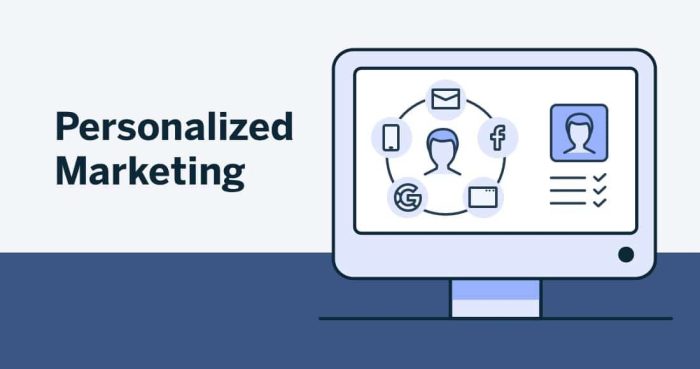With Personalization in Marketing at the forefront, get ready to dive into a world where tailored campaigns reign supreme, driving customer engagement to new heights. From email to social media, we’re about to explore the power of personalized marketing in a way that’s fresh and exciting.
Let’s break down the key steps, tools, and challenges that come with implementing personalized strategies in today’s fast-paced marketing landscape.
Importance of Personalization in Marketing
In today’s competitive market, personalization plays a crucial role in the success of marketing strategies. By tailoring messages, products, and services to individual customers, businesses can create a more meaningful and engaging experience, ultimately leading to higher customer satisfaction and loyalty.
Examples of Successful Marketing Campaigns
- Amazon: The e-commerce giant uses personalized recommendations based on customer browsing and purchase history to suggest products that are likely to interest individual shoppers.
- Sephora: The beauty retailer utilizes personalized beauty profiles to recommend products and provide tailored content to customers, enhancing their shopping experience.
- Spotify: The music streaming service curates personalized playlists for users based on their listening habits, creating a unique and enjoyable music experience.
Impact of Personalized Marketing on Customer Engagement and Retention, Personalization in Marketing
Personalized marketing has a significant impact on customer engagement and retention. When customers feel that a brand understands their needs and preferences, they are more likely to engage with the brand and make repeat purchases. By creating personalized experiences, businesses can foster stronger relationships with customers and increase loyalty. This leads to higher customer retention rates and ultimately, a more profitable business.
Strategies for Implementing Personalization: Personalization In Marketing

Implementing personalized marketing strategies can greatly enhance customer engagement and drive conversions for brands. By tailoring content and experiences to individual preferences and behaviors, brands can create a more meaningful connection with their audience. Here are some key steps for brands to start implementing personalized marketing:
Utilize Customer Data Effectively
One of the first steps in implementing personalized marketing is to collect and utilize customer data effectively. This includes gathering information on customer demographics, purchase history, browsing behavior, and preferences. Brands can use this data to segment their audience and create targeted marketing campaigns that resonate with each group.
Leverage Automation Tools
Automation tools like customer relationship management (CRM) software, email marketing platforms, and artificial intelligence (AI) can help brands streamline their personalization efforts. These tools can automate the process of sending personalized messages, recommendations, and offers to customers based on their behavior and interactions with the brand.
Implement Dynamic Content
Dynamic content allows brands to customize website experiences based on individual user data. By implementing dynamic content modules, brands can show personalized product recommendations, content suggestions, and offers to each visitor, increasing the likelihood of conversion.
A/B Testing and Optimization
To ensure the effectiveness of personalized marketing efforts, brands should regularly conduct A/B testing to compare different strategies and optimize their campaigns. By testing different variations of personalized content, brands can identify what resonates best with their audience and refine their approach accordingly.
Track and Analyze Results
It’s essential for brands to track and analyze the results of their personalized marketing campaigns. By monitoring key performance indicators like click-through rates, conversion rates, and customer engagement metrics, brands can gain insights into what’s working well and make data-driven decisions to improve their personalization strategies.
Implementing these strategies can help brands create more personalized and relevant experiences for their customers, ultimately leading to increased loyalty and sales.
Types of Personalized Marketing

Personalized marketing comes in various forms, each tailored to engage customers in a unique way. Let’s explore different types of personalized marketing strategies and how companies excel in implementing them.
Email Personalization
Email personalization involves sending targeted emails based on customer preferences, behavior, and demographics. Companies like Amazon excel in this by recommending products based on past purchases and browsing history. By personalizing subject lines, content, and offers, companies can increase open rates and conversions.
Social Media Personalization
Social media personalization focuses on delivering tailored content to users on platforms like Facebook, Instagram, and Twitter. Netflix is a prime example of this, as they recommend shows and movies based on viewing history and preferences. By analyzing user data and interactions, companies can create personalized ads and messages to engage users effectively.
Website Personalization
Website personalization involves customizing the user experience based on data such as location, device, and browsing history. Spotify excels in this by curating playlists and recommendations based on listening habits. By creating dynamic content and personalized landing pages, companies can enhance user engagement and drive conversions.
Each type of personalized marketing has its own strengths and effectiveness. While email personalization is great for direct communication and relationship building, social media personalization allows for interactive engagement and brand awareness. Website personalization, on the other hand, provides a tailored user experience and increases retention rates. By leveraging a mix of these personalized marketing approaches, companies can create a cohesive and impactful strategy to connect with their audience.
Challenges and Solutions in Personalization
Implementing personalized marketing comes with its own set of challenges that companies need to address in order to ensure successful strategies. Let’s dive into some common challenges faced by companies and propose solutions to overcome them.
Challenge: Data Privacy Concerns
One major challenge in personalization is balancing the need for data to personalize marketing efforts with customers’ privacy concerns. It’s crucial for companies to respect data privacy regulations and build trust with their customers.
- Implement transparent data practices to inform customers about how their data is being used.
- Obtain explicit consent from customers before collecting and using their personal data.
- Invest in data security measures to protect customer information from data breaches.
Challenge: Limited Data Availability
Another challenge is the availability and quality of data needed for effective personalization. Companies may struggle with incomplete or outdated data, hindering their ability to create personalized experiences.
- Invest in data collection tools and technologies to gather more accurate and up-to-date customer data.
- Utilize customer feedback and interactions to fill in gaps in data and enhance personalization efforts.
- Collaborate with other departments to collect data from various touchpoints to build a comprehensive view of each customer.
Challenge: Scaling Personalization
As companies grow and acquire more customers, scaling personalized marketing efforts can become a challenge. Maintaining a high level of personalization across a large customer base requires efficient processes and technologies.
- Automate personalized content creation and delivery using AI and machine learning algorithms.
- Segment customers based on behavior, preferences, and demographics to tailor personalized experiences at scale.
- Continuously optimize personalization strategies based on customer feedback and performance metrics.